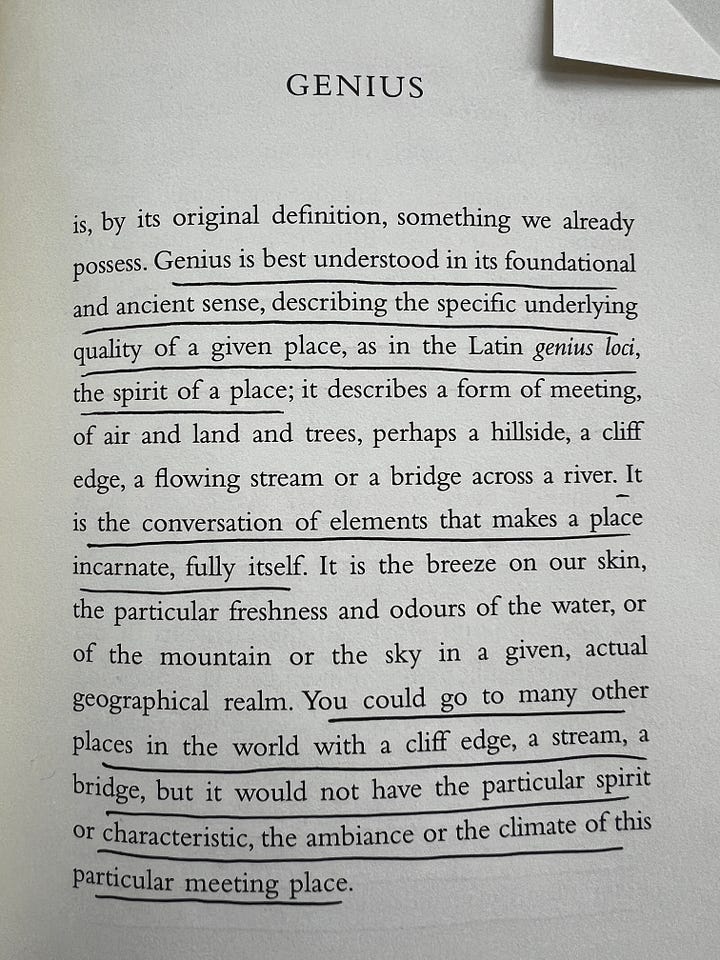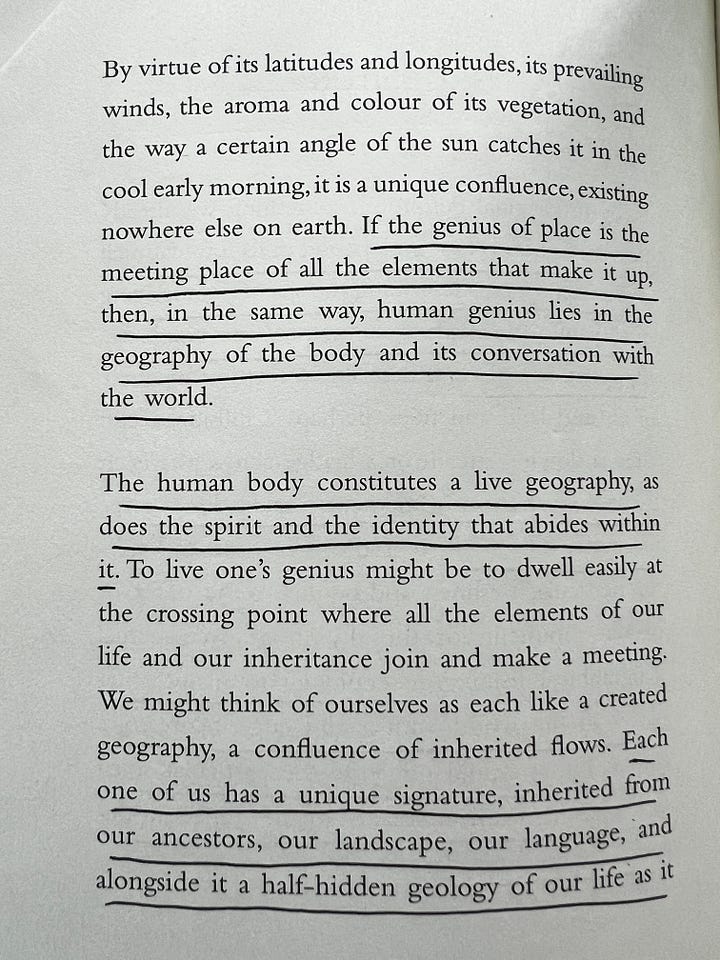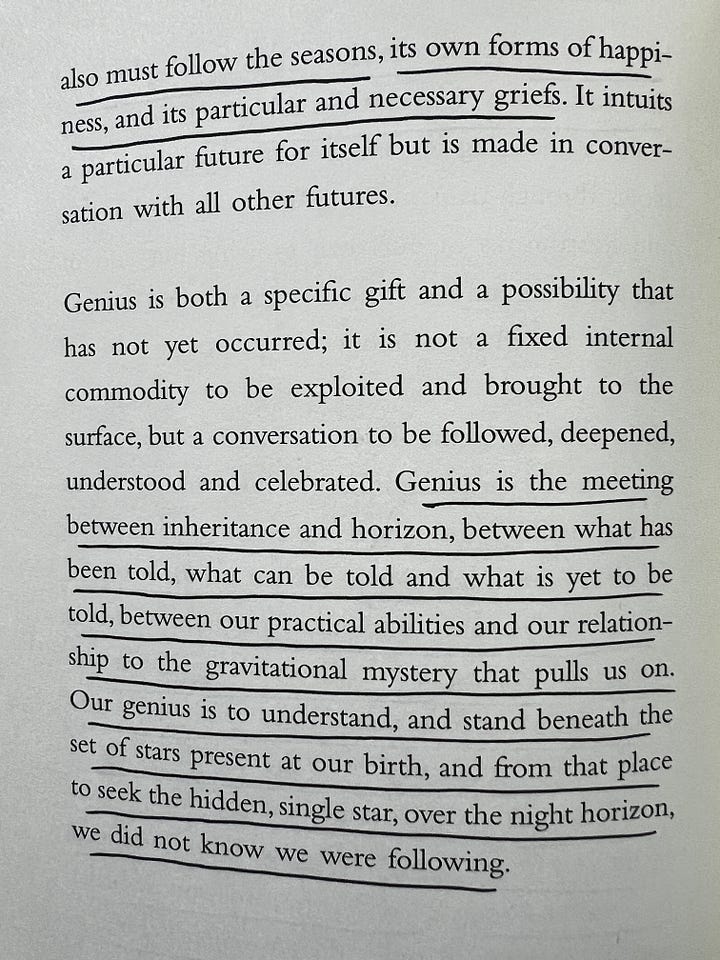✍🏼 The infinite path to dignified genius
The power of language and an inspiring human-centric vision for change
Welcome back to The Comma Project.
A space to ask the questions that matter.
A place for leaders and seekers.
A window into the story of one human’s pursuit of insight and process of becoming.
An offering of perspective, connection, and perhaps even some wisdom sprinkled in.
I hope you enjoy - and if you do, I’d be grateful if you pressed the little ❤️ button at the top left corner of this piece, and shared it with a few people you think would also enjoy it.
Reply to this email and let me know what you think.
Cheers,
Devin
The infinite path to dignified genius
Yesterday morning, I was listening to an incredible conversation between Jacqueline Novogratz, Founder and CEO of Acumen and Jim O'Shaughnessy of Infinite Loops, and it re-affirmed a belief of mine.
I believe that stories matter.
Stories are the mechanism through which we encapsulate the felt experience of our internal world, both for ourselves and for others.
I think that the most foundational layer of our experience is in fact what we feel - that our feelings are the core of who we are in any moment. It’s all pre-verbal.
Have you ever truly been able to fully capture the multitudes of who you are through words? I certainly haven’t.
I believe that this impossibility of using words to capture our identity and essence actually makes stories more important, rather than less. Because there’s no singular, simple way to fully capture who we are in words, we’re presented with an opportunity - to seek to understand the truth of who we are, authentically, at our core.
I believe that this is the infinite game of life.
As I write this, I’m reminded of a quote that I read in Mastery by Robert Greene, and that I actually included in my piece last week:
Some 2,600 years ago the ancient Greek poet Pindar wrote, “Become who you are by learning who you are.”
What he meant is the following: You are born with a particular makeup and tendencies that mark you as a piece of fate. It is who you are to the core. Some people never become who they are; they stop trusting in themselves; they conform to the tastes of others, and they end up wearing a mask that hides their true nature.
If you allow yourself to learn who you really are by paying attention to that voice and force within you, then you can become what you were fated to become - an individual, a Master.
Stories help us in this task.
Stories facilitate connection - to ourselves and others. By creating and sharing the stories of who and how we are, we learn what’s true about ourselves, and connect with others who relate.
And since words are the raw material that makes up our stories, I believe that words matter.
Jacqueline makes a point that shifted something in me.
She claims that the opposite of poverty isn’t wealth, but dignity.
Throughout listening to the conversation, she changed how I think about dignity. It became more than just its dictionary definition of “being worthy of honor or respect.” It became fuller, richer, and textured. It became a way of being. A principle. A north star.
This new conception of dignity became precisely the type of story that I’m obsessed with.
It became a story that aids us in seeking what’s true, and becoming more full and authentic versions of who we are at our core.
One that points to a deeper, more meaningful way to live and work.
And it instantly reminded me of my favorite archaeologist of life and translator into language, David Whyte, and his story of genius.
Dignity
But first, back to Jacqueline and dignity:
The opposite of poverty is dignity.
Dignity is freedom. It is choice. It is having control over decisions in our lives.
Dignity is the most fundamental of our yearnings - to be seen, to be counted, to be free.
It is this indomitable spirit that binds us as human beings, that is most fundamental to our humanity.
Defining our success not by the income we amass but by the dignity we cultivate - in ourselves and others - thus presents the greatest hope for the future of our species and our planet.
While Jacqueline is talking about what we might call a more traditional definition of economic poverty - a severe lack of economic means and basic needs and comforts - it sparks in me the thought that there’s another kind of poverty that’s much more widespread than we think. One that touches every strata of wealth and privilege.
If poverty is a lack of dignity, then on a more foundational, philosophical level, we are all in a fight to escape poverty, and there are many more impoverished people than those who look at income levels might think.
The world around us, and the many systems in place, exert their force on us as individuals, and it can be a battle to build a life that fits into these systems where we maintain, or carve out, room for our dignity and freedom.
In my experience, living a life shaped by the systems around us (instead of crafting the systems around us into a life that we shape with intention) can feel like the easier, less risky path. This is even true, and perhaps most insidious, in cases where, if allowed, the life dictated by the world around us leads to a sense of malaise - where we languish, our souls and life force in a slow drain, leaving our skies gray and feeling like there’s greater potential somewhere else out there, yet stuck in our current life.
Yes, trying to forge our own path is riskier, but I often think of the invisible risk of staying on our current, languishing path, leaving any chance of realizing our dreams a distant fairy tale. Ultimately, this is a big part of what led to me make a change, despite the fear of uncertainty that came (and still comes) with it.
This is not necessarily because systems are evil, but because systems’ incentives are aligned for the benefit of the system’s survival and flourishing, not necessarily that of its community. This is why I believe systems design is so important.
If dignity is freedom and agency - feeling connected, seen, heard, and valued - then this battle for our dignity is the adventure of human experience.
I didn’t use these words before, but hell, now I realize I was impoverished. And I’m certainly still in pursuit, daily, of greater levels of dignity’s wealth.
Though most often specifically talking about Acumen’s approach to investing capital for societal good, I see Jacqueline and her worldview as a guide and inspiration for how to live this broader, lifelong pursuit of dignity.
Acumen's theory of change starts with people….take the insights, take the lessons, and share it with the world.
It’s why we’ve started at people. It is an investing and a venture approach - but it’s also a relationship approach.
It’s a long-term commitment to people and to the planet, and to seeing investment as a means to solve a problem, and not simply as an end in and of itself.
I think Jacqueline is peering into some truth that lies beneath her work as an investor and change-maker.
She sees that work and life are both human pursuits after all. Done right, they are parts of a cohesive, integrated, authentic life in pursuit of dignity, meaning, and impact, lived as an expression of a philosophy of human flourishing.
I take great inspiration from her.
It’s about people, and process. It’s about work worth doing. It’s about leadership. It’s about connection.
And storytelling matters. Storytelling is human, built on and for connection.
This is how we make change.
If you really wanted to invest in change, then you have to find those people who made manifest character. And that ultimately, our tagline should be: “We’re Acumen, and we invest in character.”
Here’s where the word moral comes in.
Because I had to think about the moral imperative in this inter-dependent world, where action and our inaction every day impacts people around the world…Now, people everywhere are connected to each other.
I love this idea of morality as fostering dignity. And I love the possibility of living a life that’s in full alignment - where our own pursuit of personal flourishing and dignity is aligned with and connected to our work and contribution to the world, fostering the same for others.
This is the direction I’m aiming - in my individual pursuit, and with The Comma Project.
Genius
And now, to David and genius.
Please do me (and you) a favor and take 5 minutes to listen to David Whyte wax lyrical about genius in his lilting Irish/British/American accent.
I love his idea that we all have genius in us. That genius is embedded in the core of who we are - in our true nature and uniqueness - and revealed through the process of excavating and uncovering it, guided by instinct and intuition, and gifting it to the world.
Robert Greene, in Mastery, calls this process of honing our Life’s Task, our vocation, poetic and inspiring. I agree.
And David Whyte says as much, just using different language. Through poetry:
If the genius of place is the meeting place of all the elements that make it up, then, in the same way, human genius lies in the geography of the body and its conversation with the world.
Genius is the meeting between inheritance and horizon, between what has been told, what can be told and what is yet to be told, between our practical abilities and our relationship to the gravitational mystery that pulls us on.
Our genius is to understand, and stand beneath the set of stars present at our birth, and from that place to seek the hidden, single star, over the night horizon, we did not know we were following.
I see what seem to be threads of insight into our human existence weaving together, painting the beauty, integrity, and connectedness of this process that I call seeking and becoming.
I’ve come to believe that our genius and our dignity are brought to life through the story of our life - both living it and sharing it.
It’s a process that we are individually in, collectively. One that we all do, and each do.
This doesn’t mean it’s easy, however.
In fact, the eternal, ongoing, and individual nature of each of our lives brings with it an inherent uncertainty. If there’s no one-size-fits-all blueprint for our idiosyncratic life, then there can be no certainty of where we’re going, what’s along the way, or how to get there.
This is scary, at least to me.
But it’s also exciting.
And this dance between the exciting possibility and the scary unknown is what I’m seeking to come to know and navigate with more grace and flow.
We each have to do the work and forge our own path.
But we don’t have to do it alone.




Meet me in the field
At some point during the conversation, Jacqueline mentions a poem by Rumi.
It speaks of humanity. Of identity and essence. Of truth. Of connection.
I realize I’ve quoted a bunch of different things here, but this one is too good to leave out.
So I’ll leave you with it:
Out beyond ideas of wrongdoing and rightdoing,
There is a field. I'll meet you there.
When the soul lies down in that grass,
The world is too full to talk about.
Ideas, language, even the phrase each other
Doesn't make any sense.
If you enjoyed this newsletter, forward it to a curious friend and tell them which idea they'd love.
Click here to read the archive.
Click here to follow on Twitter.
If you were forwarded this email, click the button below ⬇️ and enter your email to subscribe.

